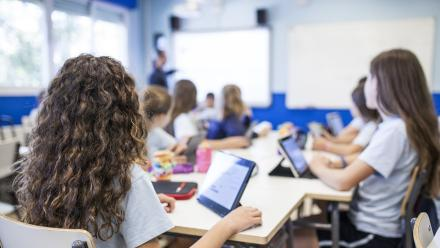« Accounts of the "end of school" have been multiplying over the past decade, with the idea of a digital turning point calling for a reinvention of education. And while technological change does not inevitably signal the end of the common educational project proposed by schools, it does shake up the school form and force us to rethink teaching and the relationship to knowledge (...) At the heart of our work, educational inequalities can be defined here (...) as differences in access to educational goods deemed unjustified and reprehensible by society. The aim is to understand the role of digital technology in creating inequalities in success and differences in career paths. »
The issue of educational digital inequalities is at the heart of the latest issue of Revue en Education (REE). The articles in this issue combine complementary approaches to the experience of teachers with that of students and their parents. The authors draw in particular on the work of the e-FRAN IDÉE research program (Digital Interactions for Education and Teaching), which considers the transformation of educational digital uses, particularly in schools, from the perspective of reducing inequalities.
Agnès Grimault-Leprince (1), Sophie Joffredo-Le Brun (2) and Pascal Plantard (3), coordinators of this issue of REE, set out in their introduction to identify " areas for the development of digital teaching and training practices that can help reduce educational inequalities ".
This dossier explores three notions that are " central to the understanding of digital society issues in education": technology appropriation, cooperation and empowerment:
- When it comes to the conditions under which teachersappropriate digital resources, "differences in appropriation can only be understood by crossing different scales of observation: that of the individual, with the importance of "digital cultural capital"; that of the professional environment, more or less active; and finally that of the territory and its political dynamics".
- The notion of cooperation is also central to understanding the use of technology in education. " In this dossier, we have chosen to focus particularly on the conditions for "working together": commitment to a common goal, attention to communication skills, maintaining horizontality through interaction, understanding the potential and pitfalls of working together, and deliberate use of appropriate knowledge and skills.
- The decision to focus on the issue ofempowerment stems from the importance of this notion in the discourse on schools, and in particular from the debate concerning the contribution of digital devices to the construction of student autonomy. " The multiplication of resources available online (texts, videos, software) is at the root of beliefs about school learning that they could encourage, outside the intervention of teachers". However, to make the most of digital resources and means, users need specific skills and forms of autonomy, which do not develop spontaneously. " It is then the dispositions built up outside school, mainly within the family, that enable pupils to achieve the expected learning outcomes". In the end, " the use of ICTE in schools, centered on self-training practices (self-correction, self-direction, self-regulation and self-control), encourages the growth of social inequalities in success ".
The articles in this issue combine multi-disciplinary approaches to digital uses in school learning (see table of contents below).
(1) Centre de recherches sur l'éducation, les apprentissages et la didactique- CREAD, Université Rennes-2.
(2) Laboratoire interdisciplinaire de recherche sur les questions vives en formation et en éducation-LIRFE, Université Catholique de l'Ouest.
(3) CREAD-Gis Marsouin, Université Rennes-2.
Contents
- Agnès Grimault-Leprince, Sophie Joffredo-Le Brun and Pascal Plantard: Editorial
- Didier Perret and Pascal Plantard: Digital cultural capital of teachers and learner territories. Analyses of the resources and paths of digital appropriation by teachers in cooperative third places.
- Isabelle Danic, Thierry Lefort and Laurent Mell: At the root of digital inequalities, secondary school teachers' relationship with digital technologies: withdrawal, appropriation or sharing?
- Simon Collin: The role of educational technology design in digital social inequalities of use
- Agnès Grimault-Leprince, Lila Le Trividic Harrache and Laurent Mell: Digital home uses and school success. The role of family socialization
- Suzane El Hage, Jean-Marie Boilevin, Ghislaine Gueudet and Marie-Pierre Lebaud: Supporting the choice of resources for digital uses that promote student autonomy: comparing an analytical grid in two disciplines.
- Andrea Tucker, Cédric Fluckiger and Thierry Gidel: Learning to work together: influences of the digital workspace on collaborative engagement
- Ghislaine Gueudet, Sophie Joffredo-Le Brun, Antoine Le Bouil, Carole Le Hénaff, Gwenaëlle Riou-Azou and Sabrina Srey: Numérique et autonomisation des élèves : quelle formation initiale des enseignants ?
- Ana Isabel Sacristán, Marisol Santacruz Rodríguez, Maria de Lourdes Miranda Quintero, Homero Enríquez Ramírez and Sandra Evely Parada Rico: Inequalities in access, training and use of digital technologies for school mathematics in two Latin American countries: Colombia and Mexico.
Référence :





